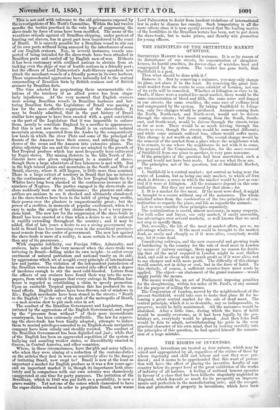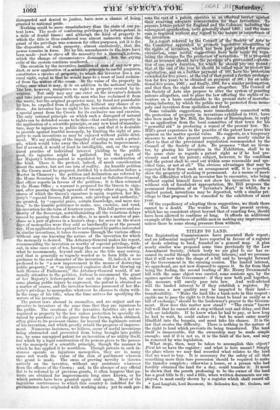THE RIGHTS OF INVENTORS.
Ar present, inventions are treated as fene nature), which may be seized and appropriated by all, regardless of the claims of those by whose ingenuity and skill and labour and cost they were pro- duced; and it seems to be apprehended that this want of protec- tion will have the effect of placing the inventive faculty, of our country below its proper level at the great exhibition of the works of industry of all nations. A feeling of national honour operates in favour of a class that has been hitherto singularly neglected in England, which depends so much for its prosperity on improve- ments and perfection in the manufacturing arts ; and the recogni- tion and protection of property in inventions, which have been disregarded and denied to justice, have now a chance of Ong, granted- to national 'pride. liothing could be more unsatiafactory than the state of our jiagi tent laws. The mode of conferring pnvilegee ,by letters-patent; of ;feudal times j and:although the kind of property to vrifieh, the title is thus. conferred was; almost .unkaown when tire., grant of the privilege Was Common for other purposes, yet it is r„,
the5disposition of Suck perty, -almost exchnavedy, that f
power remains in force. trifit by bit, amendments in the, c been madeliu:gteo stave off the necessity for a tho which the of circumstances demanded; hut
evils' of the system continue unaltered. ' • „
duet, or new application of.apseientiae prin to ;Ise purposes,
• -
The creation bythe-inventive faculties of man of an new PrO,4!
constitutes a species of FOperty, to which inventor has a na- tural right, equal to that`he would have to a tract of land reclaim- ed from the. waters of the ocean. Be the value of the property in either ease what it may, it is an addition to the national wealth. The law, however, recognizes no right to property created by in- vention. Not only may any one enter on the inventor's domain and take joint possession with the man who has reclaimed it from the waste, but the original proprietor may, by fraud not punishable by law, be expelled from it altogether, without any chance of re- dress. An inventor has no right to his invention unless he obtain a special grant from the Crown for its exclusive use and exercise. The only rational principle on which such a disregard of natural rights can be defended seems to be this—that exclusive property, in the application of a scientific principle, or any new kind of manufac- ture, may be in. jurious to public interests ; and that it is desirable to provide against hurtful monopoly, by limiting the right of pro- perty to such inventions as may be enjoyed without public detri- ment. We say nothing of the impolicy of acting on such a princi- ple, which would take away the chief stimulus to improvement ; but if avowed, it would at least be intelligible, and, on the recog- nized practice of individual interest yielding to the public good, - its injustice might be palliated. But the grant of her Majesty's letters-patent is regulated by no consideration of the kind. There is the pretext, indeed, of much consideration about the matter, but not one iota of reality. An humble petition to the Crown must be prepared, fortified by a declaration before a Master in Chancery ; the petition and declaration are referred by the Home Secretary to the Attorney-General or Solicitor-General; that officer reports in favour of the petition; it is then returned to the Home Office ; a warrant is prepared for the Queen to sign ; and, after passing through upwards of twenty other stages, in the course of which the Queen's signature is again required, her Ma- jesty's "es pecial licence, full power, sole privilege and authority," are granted, by " especial grace, certain knowledge, and mere mo- tion ' to the humble petitioner to make, use, exercise, and vend, his invention for the term of fourteen years. This full power and au- thorityof the Sovereign, notwithstanding all the vexatious delays caused by passing from office to office, is as much a matter of pur- chase as a pair of gloves in a hosier's shop ; for never in the worst days of monopolies were they sold so barefacedly as at the present day. If an application for apatent be not opposed byparties interested in similar inventions, it takes its course through the various offices -without any one knowing the nature of the invention for which the monopoly is desired. The Attorney-General makes his report, recommending the invention as worthy of especial privilege, with- -out, in nine cases out of ten, having the most remote knowledge of what he recommends, beyond such idea as the title may convey, and that is generally so vaguely worded as to form little or no guidance to the real character of the invention. If, indeed, it were professed to be " a new improvement in the means of destroying public property'," or " an improved explosive shell for blowing up both Houses of Parliament," the Attorney-General would, if un- usually attentive to the petition, forbear to recommend the grant of her Majesty's letters-patent for such an object ; but, unless sonic glaring public injury be expressed, the patent is obtained as a matter of course, and the inventor becomes possessed of her Ma- jesty's privilege to monopolize whatever he chooses to claim with- in the range of his title, when the time arrives for specifying the nature of his invention.
The patent laws abound in anomalies, and are unjust and op- pressive to inventors at the same time that they are injurious to the public. The creations of the inventive faculties are not re- cognized as property by the law unless protection be specially Ob-
tained b. y purchase; yet the grant from the Crown, when obtained, often gives to its possessor claims far beyond the legitimate extent of his invention, and which greatly retard the progress of improve- ment. Numerous instances, we believe, occur of useful inventions being obstructed and prevented from being brought into public use, by some unexpired patent for an invention of no utility itself, but which by a legal construction of its powers gives to the posses- sor the monopoly of a scientific principle, though the manner in which he has applied it be worthless. Though patents in such in- stances operate as injurious monopolies, they are in many oases not worth the value of the skin of parchment whereon the grant is made. The onus of proving novelty is thrown entirely on the inventor, without any assistance whatever from the officers of the Crown ; and, in the absence of any official list to be referred to of previous grants, it often happens that pa- tents are obtained for improvements long since known, or for which patents have been granted again and again. Most of the ingenious contrivances to which this country is indebted for its preeminence have originated with working men ; yet to such per- 'pm' J. 141 I It JR *Ilse
11 1
.'9i t'. r tifftt. Pl7Pti° .11
tip of one y
thintiat the en, ,ifflherid reOption, and on 'a further nded for five years; at the lion for five years to be obtalne, 4 pa tional five ears, 100/. ; and finally, 200
p for and that then the right should cease altogether. Tfie Council of -, A ,I barrier against sorts the (44 oX a pate hiventions. To their,* vg, adeqiiit
procure e mpatentfbr. . 11 1 1 chr ' t'including the 4O1' and trtalleusacemoef ssumubseqxsu4npi , ifi;;htiootliii4neox, :!:::!!1.: . i . . r
. m..
9 ;:.111.-1 ./161/ 11J 5bII "7- LI...Jill the i0.9131 referred b T ')4 , . t 1 1 alfilleheadg • i'l 1111 ft 1110...
11131 16 i 4'14 :: 1,0.11'1 I . 14 t e• 1, 11,1 1 1
• I
T•
III
3_U nt
11 1 1
tes as an effe- Oration, Air
•
II 1
t' • I'. •aL Vti • 1 11-1 r T pla 9
-
&fit *RANA addiga-
tblongation the Society of Arts also propose to alter the system of granting patents altogether, and to place the law affecting the rights of in- ventors on a basis conformable to the present'state of Manufac- turing industry, by which the public may be protected from mono- poly and inventors from spoliation and fraud.
Some valuable suggestions, more immediately connected with the protection of property in inventions 'exhibited in 1851, have also been made by Mr. Hill, the Recorder of Birmingham, in reply' to an application from the local committee of that town for his "powerful aid" in producing a repeal of the present law. Mr. 'ill's great experience in the practice of the patent laws gives his opinion on the matter special value. He suggests, as a temporary measure to meet the present necessity, a plan nearly similar in effect to that of the provisional registration recommended bythe Council of the Society of Arts. He proposes "that an inven- tor, by placing his invention in the Exhibition, shall be in the same state as regards a patent right as if he had pre- viously sued out his patent; subject, however, to the condition that the patent shall be sued out within some reasonable and spe- cified time, or not at all." The obvious advantages that may be expected to flow from such an arrangement will, it is expected, show the propriety of making it permanent. As a means of meet- ing the difficulties which an inventor has to encounter, who being without capital himself dares not show his invention to others without risk of fraudulent appropriation, Mr. Hill proposes the permanent formation of an " Inventor's Mart," in which, for a limited period, inventions may be deposited, with a similar pri- vilege to that proposed to be conceded to the exhibitors of next year.
Of the expediency of adopting these suggestions, we think there cannot be a doubt The wonder is, that the present system, which has no consistent object beyond ihat of exacting fees, should have been allowed to continue so long. It affords an additional example of the inertness of public men in making any improvement unless there be some strong pressure from without.
*
■
1.11
31I
• 111 pit;
Il• 1
11; 1
.....



























 Previous page
Previous page